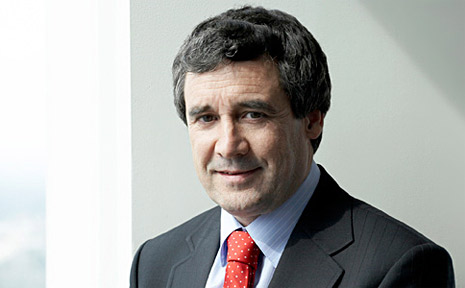With Vanguard Australia taking 40% of new money flowing into ETFs, Robin Bowerman, the group's head of corporate affairs, is a happy man.
A spectre is haunting Australian ETFs - the spectre of Vanguard.
In a remarkably short space of time, Vanguard Australia, which refused to take ETFs seriously before 2009, has overtaken BlackRock to become the largest Aussie ETF issuer. As of last month, the company was taking in 40% of new ETF inflows all by itself. On the current trend-line, Vanguard will be taking in half of new ETF money by 2021.
But with such a tidal wave of money flowing Vanguard's way, many have wondered what's driving the company's popularity. And many are wondering why only now?
The not-for-profit brand and the moral high ground
At least part of the reason for Vanguard's thundering run, it seems likely, lies in its status as a not-for-profit, and the following enjoyed by its founder, Jack Bogle.
Bogle, who invented the index fund in the 1970s, made a career calling out the vices of Wall St. Warning that finance is "an extractive industry" that "subtracts value from society," he founded Vanguard as a company owned by its investors - not by shareholders.
By creating Vanguard as a not-for-profit, Bogle sought to lock in low fees and ensure that investors' interests would be at the heart of the company's operations. At least part of Vanguard's success, it would appear, would owe to its being perceived as one of the good guys.
"Why are Vanguard edging ahead? The brand and reputation are certainly part of it," said Pat Garrett, CEO of Melbourne-based robo-advisor Six Park, which uses Vanguard ETFs in its model portfolios.
"Jack Bogle being the father of the index fund and being the pioneer in the industry also helps. Having that kind of track record and brand value builds trust."
Whether or not Vanguard deserves a seat on the moral high ground has been widely discussed. Critics and competitors insist Vanguard's staff are highly paid professionals like everyone else in asset management. They also question what difference it makes if Vanguard's funds perform the same (or worse) and charge the same (or more) as competitor fund providers.
Yet the perception that Vanguard is on the path of the righteous is almost certainly a draw.
Targeting advisors
Another key driver of the Vanguard boom has been the company's sales strategy - which has targeted gatekeepers, particularly advisors.
To this end, Vanguard has invested heavily in sales and marketing. Its Melbourne-based ETF sales team is now the biggest in the business and backed up by a heavy marketing machine.
"We have a strategy that targets primarily advisors and we're also building out communication lines to retail investors, so we're excited about growth in that market," Damien Sherman, Vanguard's head of capital markets, told ETF Stream.
"The ETF market is predominantly driven by the advisor community and retail investors. We spend a lot of time speaking to advisors and we've seen take up pick up over the last few years… it's very much an advisor-driven market."
Advisor focussed products
But targeting advisors, for Vanguard, doesn't end with calling them up and pencilling in meetings. The company has also shaped its product offering specifically with advisors in mind.
Late last year, Vanguard rolled out its suite of multi-asset ETFs, which provide exposure to global shares and bonds. The products offer portfolios within an ETF and give advisors a cheap one-stop-shop while providing a huge time saving.
"Our product range is pretty tight compared to the competitors," said Robin Bowerman, Vanguard's head of corporate affairs.
"We haven't launched a lot of products, but we have launched ones where advisors have a need. The diversified funds were the right product launched at the right time and right price."
And the funds have seen inflows. Since listing late last year, the four diversified index ETFs have attracted more than $160 million between them. The highest risk of the funds, the Vanguard Diversified High Growth Index ETF (VDHG), has proved particularly popular (especially with young men) and retains a cult following on Reddit.
Sticking with what they know
Another clear driver of Vanguard's growth has been its sticking with what it knows and what it's known for.
As the ETF industry has grown and competition intensified, many ETF providers have started offering more specialised products. By being first to a new asset class or segment, ETF providers hope to steal first mover advantage (which is substantial in the ETF industry) and dodge the fee war, which is putting the machete to profit margins on plain vanilla ETFs.
But in the fee war, Vanguard has decided to use its not-for-profit structure to play apex predator. With no shareholders nagging for dividends, no analyst quarterly reports or stock price to sweat on, the company has stuck it out in plain vanilla and remained aloof as to how profitable its products are.
Plain vanilla ETFs still take the majority of money flowing into ETFs.
"They stick to their core values quite well," Mr Garrett said.
"They haven't gone out with too many ETFs yet that stray from the fundamental value proposition from the basic index fund. They stick to their core competencies and have done it well."
Competitors
Other issuers have already started responding to Vanguard's growing lead. Both BlackRock and State Street have recently hired new sales staff to try and up their share of inflows. BetaShares has responded by listing the lowest cost Australian tracking ETF, in an unusual move to unpriced the chief under-pricer.
Both Messrs Sherman and Bowerman refused to comment on what Vanguard's next move would be. But one suspects new cheap products can't be too far away.




